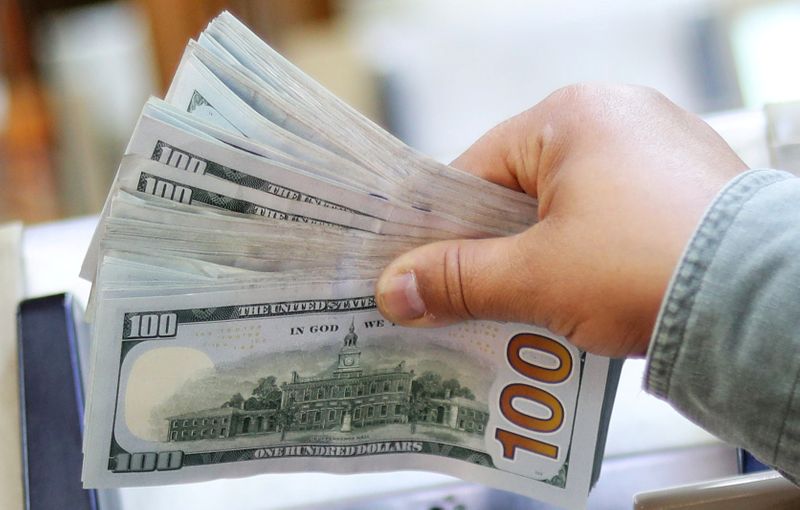By Gertrude Chavez-Dreyfuss, Saikat Chatterjee and Dhara Ranasinghe
NEW YORK/LONDON (Reuters) - A 10% decline in the value of the U.S. dollar since March has boosted returns for foreign investors in the world's largest government bond market at a time when U.S. Treasury yields are near record lows.
German and Japanese buyers of U.S. government debt can pocket a few basis points in yield after hedging their foreign exchange exposure back to their home currencies, despite a 140 basis-point drop in 10-year Treasury yields so far this year.
For Japanese investors, buying U.S. 10-year debt and hedging back to yen using three-month currency forwards would net a total yield of 10 basis points, Neuberger Berman data showed. It was -74 basis points a year ago, and negative for nearly three years before that, due to higher U.S. interest rates.
The situation is roughly similar for a German investor. Buying U.S. 10-year Treasuries and hedging back to euros showed a yield of -20 basis points, up from nearly -100 basis points a year earlier.
Going out the curve helps, though, with a positive yield of 48 basis points if one buys U.S. 30-year bonds and hedges back to euros, compared with -43 basis points last year, according to Refinitiv data.
"There is an incentive to hedge more in U.S. fixed income because the dollar is weak," said Ugo Lancioni, head of global currencies at Neuberger Berman, which oversees $357 billion in assets.
"U.S. bonds have become more attractive now on a hedged basis in absolute terms, specifically for Japanese and European investors, than they were pre-COVID."
Hedges are typically done through forwards that specify the rate at which currencies can be exchanged at the end of a contract period -- usually three to six months. Interest rate differentials determines the forward rate.
A few basis points in yield pick-up can make a big difference for investors in the euro area and Japan, where deeply negative yields effectively mean paying governments there to buy their debt. But leaving U.S. bonds unhedged could also wipe out foreign investor gains if the dollar weakens further.
A big part of the equation to hedge more is the drop in hedging costs after the Federal Reserve slashed U.S. rates to near-zero in March to mitigate the economic havoc caused by the coronavirus pandemic.
For most of the 2017-2019 period, a European bond investor who swapped German Bunds for 10-year Treasuries and hedged the dollar exposure back to euros would have seen steep hedging costs erode any U.S. yield advantage, said Rob Robis, chief global fixed income strategist, at BCA Research.
U.S. 10-year Treasury yields were at 1.93% in November 2018, six times the 0.34% available in their German counterparts. But the fat U.S. yield advantage was wiped out if hedging costs of about 3% are considered.
Many foreigners had eschewed hedging their FX risks when buying U.S. debt because of the higher yield and expectations of a sturdy dollar, which has surged 30% against its rivals (=USD) since the 2008 global financial crisis.
But the March rate cuts have steepened the U.S. yield curve compared with its Japanese counterpart for the first time "in years, making this kind of FX-hedged investments attractive," said Oliver Brennan, TS Lombard macro strategist.
(GRAPHIC - Yield Curves: https://fingfx.thomsonreuters.com/gfx/mkt/xegvbaeympq/Yield%20Curves.JPG)
To be sure, some analysts warned a further deterioration in the U.S. economic outlook could sour investor appetite for dollar-denominated assets.
Massive U.S. fiscal stimulus could spur inflation, which should tarnish the attractiveness of long bonds, while last month's landmark agreement on a 750 billion-euro European recovery fund for COVID-19, has boosted sentiment on euro-based assets.
There are already signs foreign investors are favoring some European assets. Excluding those in Europe, offshore investors bought almost a third of new Italian 10-year government bonds in June.
For now, U.S. bonds remain king despite fiscal challenges and slowing growth momentum.
"There are often no alternatives for investors who maneuver large pools of money through global financial markets," said Robert Brauns, portfolio manager for multi-strategy fixed income at BNP Paribas (OTC:BNPQY) Asset Management.
He believes the ongoing U.S. recovery from the virus-induced recession "has room to extend further," which should take asset valuations higher the next six to 12 months as the economy goes back to normal.

(GRAPHIC - FX yields: https://fingfx.thomsonreuters.com/gfx/mkt/xklvydlgdpg/FX%20adjusted%20yield.JPG)